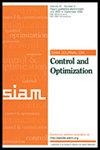On Tracking and Antidisturbance Ability of PID Controllers
IF 2.4
2区 数学
Q2 AUTOMATION & CONTROL SYSTEMS
引用次数: 0
Abstract
SIAM Journal on Control and Optimization, Volume 62, Issue 3, Page 1857-1883, June 2024.Abstract. In this paper, we are concerned with the tracking performance and antidisturbance ability of the widely used proportional-integral-derivative (PID) controllers in practice. Towards this end, we consider a basic class of second-order nonlinear stochastic control systems subject to model uncertainties and external disturbances, and focus on the ability of the classical PID controller to track time-varying reference signals. First, under some suitable conditions on the system nonlinear functions, reference signals, and external disturbances, we show that such control systems can be stabilized in the mean square sense, provided that the three PID gains are selected from a stability region constructed in the paper. Besides, it is shown that the steady-state tracking error has an upper bound proportional to the sum of the varying rates of reference signals, the varying rates of external disturbances, and the intensity of random noises. Meanwhile, its proportional coefficient depends on the selection of PID gains, which can be made arbitrarily small by choosing suitably large PID gains. Finally, by introducing a desired transient process which is shaped from the reference signal, a new PID tuning rule is presented, which can guarantee both the expected steady state and transient tracking performance.
论 PID 控制器的跟踪和抗干扰能力
SIAM 控制与优化期刊》第 62 卷第 3 期第 1857-1883 页,2024 年 6 月。 摘要本文关注实际中广泛使用的比例积分派生(PID)控制器的跟踪性能和抗干扰能力。为此,我们考虑了一类受模型不确定性和外部扰动影响的基本二阶非线性随机控制系统,并重点研究了经典 PID 控制器跟踪时变参考信号的能力。首先,在系统非线性函数、参考信号和外部扰动的一些合适条件下,我们证明了只要从本文构建的稳定区域中选择三个 PID 增益,此类控制系统就能在均方意义上稳定。此外,研究还表明,稳态跟踪误差的上限与参考信号变化率、外部干扰变化率和随机噪声强度之和成正比。同时,其比例系数取决于 PID 增益的选择,可以通过选择适当大的 PID 增益使其任意变小。最后,通过引入由参考信号形成的理想瞬态过程,提出了一种新的 PID 调节规则,它能保证预期的稳态和瞬态跟踪性能。
本文章由计算机程序翻译,如有差异,请以英文原文为准。
求助全文
约1分钟内获得全文
求助全文
来源期刊
CiteScore
4.00
自引率
4.50%
发文量
143
审稿时长
12 months
期刊介绍:
SIAM Journal on Control and Optimization (SICON) publishes original research articles on the mathematics and applications of control theory and certain parts of optimization theory. Papers considered for publication must be significant at both the mathematical level and the level of applications or potential applications. Papers containing mostly routine mathematics or those with no discernible connection to control and systems theory or optimization will not be considered for publication. From time to time, the journal will also publish authoritative surveys of important subject areas in control theory and optimization whose level of maturity permits a clear and unified exposition.
The broad areas mentioned above are intended to encompass a wide range of mathematical techniques and scientific, engineering, economic, and industrial applications. These include stochastic and deterministic methods in control, estimation, and identification of systems; modeling and realization of complex control systems; the numerical analysis and related computational methodology of control processes and allied issues; and the development of mathematical theories and techniques that give new insights into old problems or provide the basis for further progress in control theory and optimization. Within the field of optimization, the journal focuses on the parts that are relevant to dynamic and control systems. Contributions to numerical methodology are also welcome in accordance with these aims, especially as related to large-scale problems and decomposition as well as to fundamental questions of convergence and approximation.

 求助内容:
求助内容: 应助结果提醒方式:
应助结果提醒方式:


